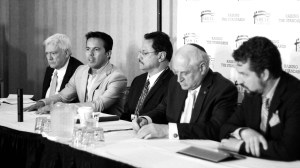In this series

Hispanic Christians—whether evangelicals, mainline Protestants, or Catholics—are more likely to say the nation of Israel has the right to exist than the average American.
They worry about the fate of Christians in the Palestinian territories, and sympathize with both Palestinians and Israelis.
But the Bible, most say, has little to do with how they see Israel.
Those are among the findings of an online survey of self-identified Hispanic Christians and their views on Israel from Nashville-based LifeWay Research.
Few Hispanic Christians have a negative view of Israel, said Scott McConnell, executive director of LifeWay Research. But many have no opinion.
“Overall, Israel isn’t a major concern for many Hispanic Christians,” he said.
More supportive than Americans in general
The survey’s sponsor, the National Hispanic Christian Leadership Conference (NHCLC), and other groups have sought in recent years to bring more diversity to Christian Zionism.
The new survey finds that Hispanic Christians are generally supportive of Israel. Half say the modern state of Israel, which was founded in 1948, has the right to exist. Only 15 percent disagree, while 35 percent aren’t sure.
For comparison, a 2015 LifeWay Research study found Americans much more skeptical about Israel. When asked if they supported Israel’s statehood, 42 percent agreed, 35 percent disagreed, and 23 percent were not sure.
The 2017 survey found only a quarter of Hispanic Christians in the US have a negative view of Israel (26%), while nearly half have a positive view (45%). The rest are unsure (28%).

About a third (34%) think the US is doing enough to help Israel. Fewer say the US does too much (19%) or too little (18%) to help Israel. The rest are unsure (29%).
Hispanic Christians seem reluctant to take sides in the dispute between Israelis and Palestinians. Two-thirds sympathize with the hardships faced by both sides (66%). A quarter sympathize more with Israelis (27%). Only 7 percent sympathize more with Palestinians.
Most Hispanic Christians also worry about the welfare of Christians in parts of the Holy Land. Three-quarters say they are concerned about the safety of Christians in territories governed by the Palestinian Authority (72%), while 10 percent disagree and 18 percent aren’t sure.
Role of religion complicated
Faith plays a role in how Hispanic Christians see Israel. But they often disagree on how the two are related.
When asked if the modern nation of Israel is “a fulfillment of God’s covenant with the Jewish people,” 40 percent agree, 21 percent disagree, and 39 percent are not sure.
And more Hispanic Christians cite the media (34%) than the Bible (16%) when asked what most shapes their views on Israel.
Among Hispanic Christians who support Israel’s right to exist, few cite the Bible (7%) or Bible prophecy (11%) as the reason for doing so. Instead, 55 percent say Israel has a right to exist because every nation has a right to exist.
Researchers found that self-identified Hispanic evangelicals are by far the most ardent supporters of Israel:
- 59 percent have a positive view of Israel.
- 58 percent say Israel has a right to exist.
- 83 percent are concerned about the safety of Christians in areas under control of the Palestinian Authority.
- 35 percent say the US does not do enough to help Israel.
- 49 percent sympathize with the hardships Israelis face.
- 54 percent say the Bible shapes their views on of Israel.
- 15 percent cite the Bible as the main reason they support Israel’s statehood.
- 28 percent support Israel because of its role in biblical prophecy.
Support among Hispanic evangelicals differs slightly from American evangelicals in general.
American evangelicals overall were less likely to say they support Israel’s right to exist as a state (50%), but more likely to make a connection between their faith and their views on Israel.
About 7 in 10 American evangelicals said the modern nation of Israel was formed as a result of biblical prophecy (69%). And 73 percent of American evangelicals said events in Israel are part of the prophecies in the Book of Revelation.
Tony Suarez, executive vice president of the NHCLC, says Hispanics—and especially Hispanic Christians—will play an important role in shaping American policy toward Israel in the future. So understanding their views on Israel is essential.
“Their support for Israel should not be taken for granted,” he said.
Disconnect with the Jewish community
As part of the survey, sponsored by the NHCLC and the Philos Project, LifeWay Research also looked at several other issues, including views of Hispanic Christians on politics, foreign policy, the media, and the Jewish community.
They found about a third are more likely to vote for a candidate who had pro-Israel views (33%). More than half say a politician’s views on Israel doesn’t affect their vote (53%). Only 14 percent are less likely to vote for a candidate who has pro-Israel views.
On foreign policy, Hispanic Christians are ambivalent about the role the US plays in solving the world’s problems: 40 percent say the US does too much; 32 percent say the US does the right amount; 15 percent say the US does too little; and 14 percent are not sure.
Television is the most popular news source for Hispanic Christians (85%), followed by social media (55%), websites (47%) and radio (37%). Less than a third rely on print newspapers or magazines (29%).
Researchers found a disconnect between many Hispanic Christians and the Jewish community. Just over a third say they have Jewish friends (36%), while half have no Jewish friends (49%).
A significant number of Hispanic Christians hold somewhat anti-Semitic views, said McConnell. About 4 in 10 say Jewish Americans have too much influence in American society (42%), while about 3 in 10 disagree (31%). A quarter are not sure (27%).
That’s a troubling finding, said McConnell.
“There appears to be at least some resentment among Hispanic Christians,” he said. “It’s clear there’s a disconnect between this group of Hispanic Christians and Jewish Americans.”
Jesse Rojo, Hispanic Affairs Director for the Philos Project, agrees.
His organization has been sponsoring trips to bring Hispanic Christian leaders to Israel to connect with Jewish leaders in that country. They’ve also worked to connect Hispanic leaders and Jewish leaders in the United States.
“There should be more efforts on the local level to build bridges between these two communities,” Rojo said. “There is a lot more work to be done.”
Bob Smietana is senior writer for Facts & Trends magazine.
Methodology:
The online survey of Americans was conducted January 11 – 23, 2017. The project was sponsored by the National Hispanic Christian Leadership Conference and the Philos Project. Targeted sample was obtained from national online panels. This sample was screened to only include self-identified Latino/Hispanic adults who indicate a religious preference of Catholic or Protestant/Non-denominational. Maximum quotas and slight weights were used for gender, region, age, education, Catholic/Protestant, country of origin and generation immigrated to more accurately reflect the Hispanic Christian population using statistics published by Pew Research and the Census Bureau. The completed sample is 1,038 surveys. The sample provides 95 percent confidence that the sampling error does not exceed plus or minus 4.1 percent including weight effects. Margins of error are higher in sub-groups.
LifeWay Research is a Nashville-based, evangelical research firm that specializes in surveys about faith in culture and matters that affect churches.
















